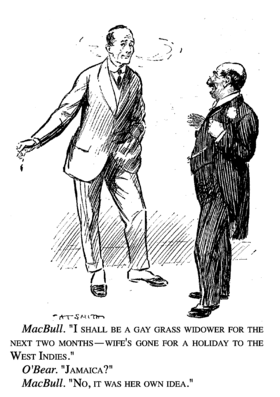
Back Woordspeling AF جناس Arabic Cinas AZ Kalauer BAR Каламбур BE Калямбур BE-X-OLD Каламбур Bulgarian Calembour Catalan Kalambúr Czech Gair mwys CY

A pun, also known as a paronomasia in the context of linguistics, is a form of word play that exploits multiple meanings of a term, or of similar-sounding words, for an intended humorous or rhetorical effect.[3] These ambiguities can arise from the intentional use of homophonic, homographic, metonymic, or figurative language. A pun differs from a malapropism in that a malapropism is an incorrect variation on a correct expression, while a pun involves expressions with multiple (correct or fairly reasonable) interpretations. Puns may be regarded as in-jokes or idiomatic constructions, especially as their usage and meaning are usually specific to a particular language or its culture.
Puns have a long history in writing. For example, the Roman playwright Plautus was famous for his puns and word games.[4][5]
- ^ Ben Zimmer. "Jottings on the 'Jamaica' joke", Language Log, 14 September 2008.
- ^ Although Zimmer was not able to trace it to its source, the Jamaica joke originated in American college boy humour: "(No headline)". The Yale Record. Vol. XL, no. 15. 2 June 1912. p. 447. Retrieved 23 April 2023.; "In Lighter Vein". The Brown Alumni Monthly. Vol. XIII, no. 4. November 1912. p. 111. Retrieved 28 April 2023.; "Commuting". The Graduate/University of California Medical Center. 1914. p. 88. Retrieved 28 April 2023.
- ^ "paronomasia". rhetoric.byu.edu. Retrieved 2 June 2021.
- ^ Pollack, John (14 April 2011). The Pun Also Rises. Penguin Publishing Group. ISBN 978-1-101-51386-6.
- ^ Fontaine, Michael (2010). Funny Words in Plautine Comedy. Oxford University Press.